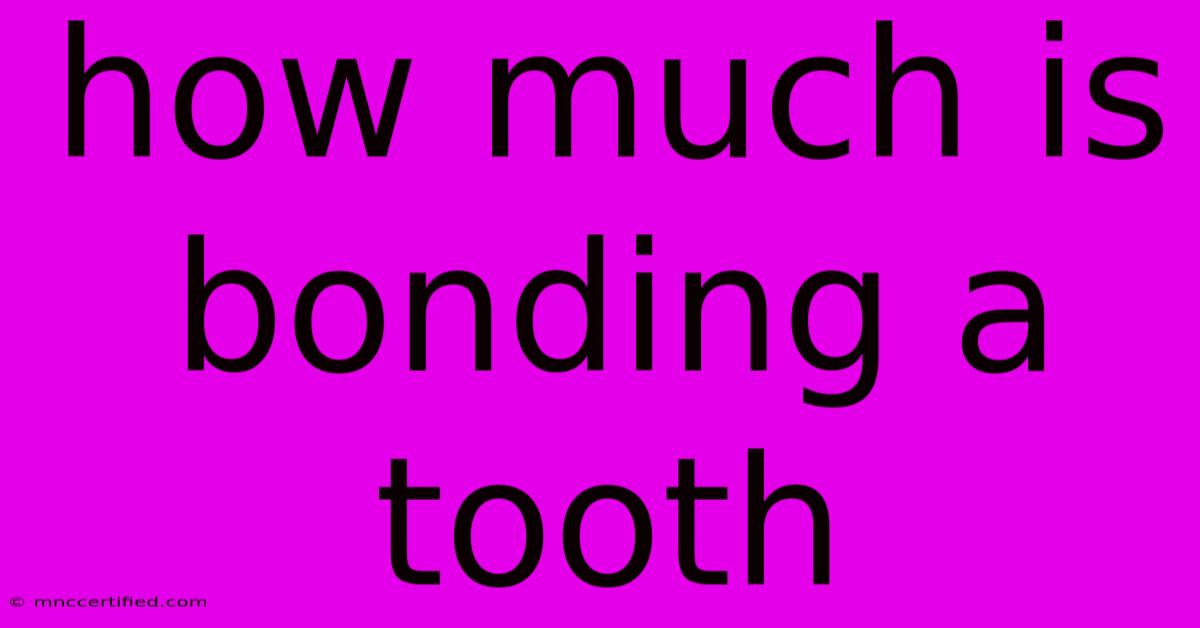How Much Is Bonding A Tooth

Table of Contents
How Much Does Bonding a Tooth Cost? A Comprehensive Guide
Dental bonding is a popular cosmetic procedure used to improve the appearance of teeth. It's a relatively quick and affordable way to fix chipped, cracked, discolored, or gapped teeth. But how much does it actually cost? This comprehensive guide will break down the factors influencing the price of tooth bonding and help you understand what to expect.
Factors Affecting the Cost of Tooth Bonding
Several factors contribute to the overall cost of tooth bonding, making it difficult to give a single definitive answer. These include:
1. Extent of the Repair:
- Minor repairs: Fixing a small chip or crack will naturally cost less than a more extensive procedure involving reshaping a significantly damaged tooth.
- Number of teeth: Bonding multiple teeth will obviously increase the total cost. The price is usually quoted per tooth.
2. Your Location:
- Geographic location: Costs vary significantly depending on your location. Dental practices in larger cities or areas with a higher cost of living tend to charge more than those in smaller towns or rural areas.
- Dentist's experience and reputation: Experienced cosmetic dentists with a strong reputation often charge more than general dentists.
3. Type of Resin:
- Resin material: The type of resin used impacts the cost. Higher-quality resins, offering better color matching and durability, will typically be more expensive.
4. Insurance Coverage:
- Insurance plans: Many dental insurance plans offer partial coverage for tooth bonding, but the extent of coverage varies widely depending on your specific plan. It's crucial to check your policy details to understand your benefits. Contact your insurance provider directly to determine your coverage.
5. Additional Procedures:
- Pre-bonding treatments: Sometimes, additional procedures like teeth cleaning or minor preparation work might be necessary before bonding, adding to the overall cost.
Average Cost of Tooth Bonding
While the exact cost can vary dramatically, a reasonable estimate for bonding a single tooth in the United States ranges from $300 to $600. This is just an average; prices can easily go higher or lower depending on the factors listed above. For multiple teeth, the cost will naturally increase proportionally.
Is Tooth Bonding Worth It?
Tooth bonding offers several advantages:
- Relatively inexpensive: Compared to other cosmetic procedures like veneers or crowns, bonding is significantly more affordable.
- Quick procedure: The procedure usually takes only one appointment.
- Minimal preparation: Minimal tooth preparation is required, preserving more of your natural tooth structure.
- Natural-looking results: When done by a skilled dentist, bonding provides natural-looking results that blend seamlessly with your existing teeth.
However, it's important to note that:
- Durability: Bonded teeth are not as durable as veneers or crowns and may require replacement over time. Proper care and oral hygiene are crucial.
- Staining: Bonded resin can be susceptible to staining, particularly from dark-colored beverages like coffee or tea.
Finding an Affordable Dentist
To find an affordable dentist who provides high-quality tooth bonding, consider the following:
- Check online reviews: Read reviews on websites like Google Reviews, Yelp, or Healthgrades to assess the quality of service and pricing.
- Ask for consultations: Schedule consultations with several dentists to compare prices and treatment plans.
- Look for discounts and financing options: Some dental practices offer discounts or financing plans to make treatment more affordable.
- Consider dental schools: Dental schools often provide more affordable services performed by students under the supervision of experienced dentists.
Remember to discuss all aspects of the procedure, including costs and potential risks, with your dentist before proceeding. Getting multiple quotes and understanding your insurance coverage are essential steps in making an informed decision.
Keywords: tooth bonding cost, dental bonding price, how much does tooth bonding cost, cost of bonding a tooth, tooth bonding expense, dental bonding expenses, affordable tooth bonding, cheap tooth bonding, tooth bonding insurance, factors affecting tooth bonding cost.

Thank you for visiting our website wich cover about How Much Is Bonding A Tooth. We hope the information provided has been useful to you. Feel free to contact us if you have any questions or need further assistance. See you next time and dont miss to bookmark.
Featured Posts
-
Dortmund Vs Bayern Live Bundesliga 2024 Score
Dec 01, 2024
-
Five Facts About Kash Patel
Dec 01, 2024
-
Life Insurance Shreveport La
Dec 01, 2024
-
Premier League West Ham Arsenal Result
Dec 01, 2024
-
Kerr Temp Bond Instructions
Dec 01, 2024